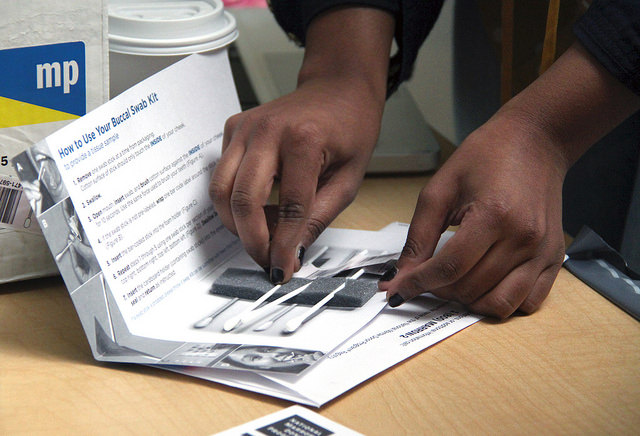Be The Match hosts bone marrow registration event
Potential donors swab to save a life
Karishma Reddy, ’16, vice president of the Pre-Health Club, places cotton swabs used to collect DNA in a swab kit. The community was invited to sign up to be in the bone marrow registry in the campus center on Tuesday, April 7.
Be The Match held a registration event for potential bone marrow donors on Tuesday, April 7 from 11-1 p.m. in the campus center lobby. As the nations largest bone marrow network, Be The Match currently has 11 million potential downers in its database.
Around 12,000 people a year need a bone marrow transplant. Bone marrow recipients typically have blood diseases ranging from leukemia, sickle cell anemia, lymphoma and more. Bone marrow is essential as it is one of the main producers of white and red blood cells. People with a blood disease tend to lack or do not properly produce their own bone marrow. As a result, they are prone to illness.
Bone marrow transplants are one of the solutions to saving these patients as it helps to replenish and sustain the 200 billion blood cells that an average person should be producing within the span of day.
Through Be The Match, Allegheny students and faculty members were given the opportunity to register to help patients get one step closer to finding a match. The participants first gave their name, address, phone number and filled out a medical questionnaire. Next, four cheek swab samples were taken and sealed in an envelope to be sent to a lab for tissue analysis. Matches are found through the tissue samples, pairing downers with potential recipients.
Be The Match gives patients whose family are unable to provide a bone marrow match, a better chance of finding a suitable donor.
Michael Garbin, senior community engagement representative of Be The Match, has visited schools all over Northwestern Pennsylvania and Upstate New York registering donors. On average 20-25 students sign up and give samples.
Over his five-year career with Be The Match, 100 of his participants have gone on to donate. His recipients of the bone marrow have ranged from a three-month-old child to a 75-year-old grandparent. Be the Match is a job that Garbin holds to high importance.
“A friend of mine many years ago needed bone marrow to save their life, unfortunately they did not find a match in time. This is why I am a part of the organization now,” Garbin said.
Through the help of representatives such as Garbin, Be The Match has been able to provide potential donors to more than 600 countries globally. On average the organization has matched 6,300 successful transplants a year and the number is only growing with the increase of participants and awareness.
David Klodowski, ’16, president of the Allegheny Pre-Health Club, volunteered to make a further impact on these numbers.
“One of the biggest diseases we don’t have funding for is blood cancer,” said Klodowksi. “I’m here to help raise awareness and increase numbers in the registry.”
Klodowski and the Pre-Health Club reached out to the Allegheny community through posters and Greek life.
“People are willing to help if you reach out to them,” Klodowski said.
One of the participants of the Be The Match registration Jake Lebsack, ’16, did exactly that when his fraternity, Delta Tau Delta was informed of the cause.
“David is a member of my fraternity and some of the members had shared some stories that inspired me to volunteer,” Lebsack said.
The success in registration at Allegheny College has led the organization to come back for four years, especially with the partnership between the Pre-Health Club and Be The Match.
Be The Match is expected to return to campus in spring 2016 to conduct another registration event.









